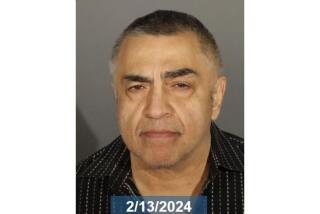Nix Bragged About Hit, Witnesses Say : Trial: Former manager of a Kearny Mesa car dealership told of hiring two men from Mexico to kill the plaintiff in a lawsuit, court hears in murder-for-hire trial.
- Share via
William Wayne Nix, a former executive of a San Diego car dealership, said he hired two men to kill one of his former employees and then bragged about it to those who worked for him, witnesses testified Thursday on the opening day of a murder-for-hire trial in Vista Superior Court.
Nix, who had been a manager of a Kearny Mesa car dealership and later owned a dealership in Pomona, is accused of giving one of his mechanics $10,000 in 1988 to hire hit men from Mexico to kill Sal Ruscitti, a one-time friend and car salesman.
In opening statements Thursday before the jury and Judge J. Morgan Lester, Assistant U.S. Atty. Larry Burns said Nix was motivated by “anger and fear” to kill Ruscitti, who had worked with Nix as a salesman at Center City Ford between 1980 and 1985.
In 1986, Ruscitti filed a lawsuit against Center City Ford, a car dealership that had been owned by Nix’s mother, Lula Mae Osborne, and his stepfather, Ralph Osborne. The 17 plaintiffs in the lawsuit alleged that they had been cheated out of about $2.5 million in commissions by the dealership.
Eventually, the number of plaintiffs ballooned to more than 300 after Ruscitti recruited more salesmen to join the lawsuit, testified Karen Stawiecki, the lead attorney in the civil action.
“He told me the lawsuit was upsetting his folks. He was very (angry),” testified James Walczak, a car salesman who worked for Nix at the dealership in Pomona. “He said it was hurting his mother and she was very upset.”
Both Walczak and Steven Gates, a sales manager at the Pomona dealership, testified that Nix became more and more angry at Ruscitti as the lawsuit progressed, to the point of threatening to hire someone to shoot the seeing eye dog of Ruscitti’s blind daughter, Gina.
“He said Sal needed to be sent a kind of a message about the lawsuit, and that it was upsetting his family,” testified Gates, who originally had been a defendant in the case but accepted a plea bargain from the district attorney’s office in exchange for his testimony.
A month before the Sept. 17, 1988, shooting, Nix said that Ruscitti had planned to file another lawsuit against his dealership, Walczak testified.
“He was madder than hell then. He was beside himself,” Walczak testified about Nix.
Indeed, Stawiecki testified that, shortly before his death, Ruscitti had her prepare a draft complaint for a lawsuit against Will Nix Ford in Pomona.
Two weeks before Ruscitti was gunned down in the doorway of his Leucadia home, Nix talked “about eliminating the problem and doing something with Sal,” Walczak said.
On the day of Ruscitti’s death, Nix, who nicknamed himself “The Bull,” told Walczak that “Sal was a dead man.”
“He said that, ‘You (expletive) with The Bull, you get the horn,” Walczak recounted.
The next day, Walczak learned that Ruscitti had been killed.
“He said he had (Ruscitti) hit by two men from Mexico, and that it would be impossible to trace them down because they are out of the country,” Walczak said.
In the defense’s opening statement, William Fletcher argued that Nix had no motive for the killing, since the lawsuit was aimed against the company who bought the dealership from the Osbornes, and that it was Paul Gonzalez, a mechanic for Nix, who plotted Ruscitti’s death to curry favor with Nix.
If the lawsuit were successful, however, it is likely that the Osbornes would be held liable for the damages, since it was under their ownership that the withholding of commissions allegedly occurred, Stawiecki testified.
But Fletcher said the Osbornes were never served notice in the lawsuit and were never named as part of it.
“If a lawsuit is a motive to kill someone, then everytime anyone files a lawsuit in this county, they have to be afraid of being killed? That’s ludicrous,” Fletcher said outside the courtroom.
Also in his opening statement, Fletcher said the case against Nix was built on the “fear of prosecution and the power of forgiveness,” citing the fact that several of the witnesses, including Gates, had accepted plea bargains in exchange for their testimony against Nix.
In prior testimony before two grand juries, Gates testified that Nix had never mentioned that he was in any way involved with Ruscitti’s death. Gates is expected to plead guilty to being an accessory to murder after the crime and could be sentenced to a maximum of three years in prison. Before the plea bargain, he faced a life sentence if convicted with Nix of conspiracy to murder.
More to Read
Sign up for Essential California
The most important California stories and recommendations in your inbox every morning.
You may occasionally receive promotional content from the Los Angeles Times.













